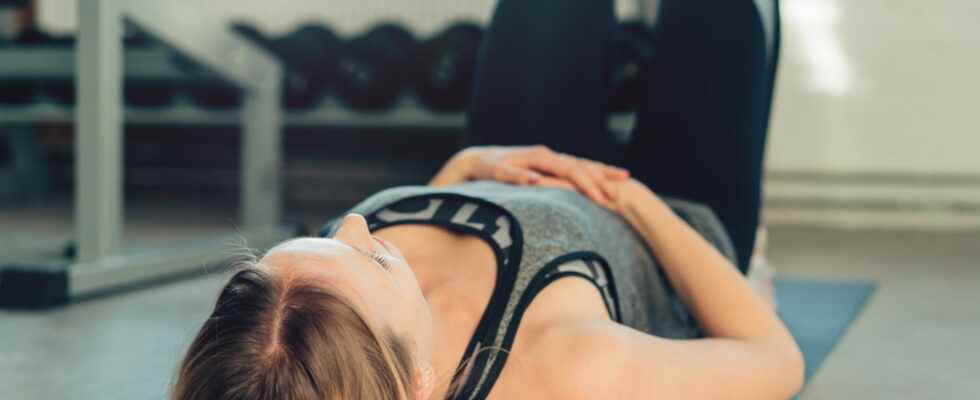Hypopressive abs rely on specific breathing and “false chest inspiration”. They prevent organ descent and urinary leakage. Discovery.
The exercises to strengthen your abs are divided into two categories: so-called hypo-pressure abs (or hypopressive abs) and abs hyperpressives that create abdominal pressure. Abs in hypo pressure rely on posture and breathing. They have many health benefits. Which ? What advantages for women ? During menopause? In prevention of organ descent? Can we practice them during the pregnancy ? Are there any contraindications?
What are hypopressive abs?
It’s a tabdominal muscle strengthening technique. Abdominal hypopressure or “false thoracic inspiration” consists of performing abdominal exercises expiring (blowing) voluntarily when exerting. Breathing with effort and managing abdominal pressure through sheathing are the two keys to hypopressive abs. “For example, the tennis player exhaling making a loud noise when he hits the ball uses hypopressure. In common parlance, we will say hypopressive abs to qualify abs that do not generate abdominal pressure“says Erwann Le Rumeur, masseur-physiotherapist. “In fact, if we look at an ultrasound at the time of perform a “crunch”, we note that the bladder is crushed and pushed down“adds our interlocutor. The hypopressure relies on use of the transverse muscle by the sheath to avoid creating pressure on the bladder. “You can do weight lifting, sheathing, abs and all types of exercises in hypopressive“ underlines Erwann Le Rumeur.
The contraction of the perineum is done before each expiration, thus activating the transverse muscle. The contraction will be directed in a movement of aspiration from bottom to top and followed by an expiration aiming at the rise of the viscera. Lying on your back, arms along your body and knees bent (without voluntarily crushing your lower back on the ground), take a deep breath in while inflating the belly. Then, we exhale by bringing in the belly and inhaling the navel. Breathing is blocked by swallowing the belly. It is recommended to hold each step for several seconds.
What are the benefits of hypopressive abs?
The hypopressive abs do not push the organs down and therefore protect the perineum. They also strengthen the back and allow better stability of the spine by working the deep muscles such as the transverse and the obliques. They refine the waist and tone the belly. hypopressive abs massage the intestines and improve transit. They can be beneficial in case of a swollen belly or constipation.
Why favor these abs?
“This type of abs is to be preferred in a situation postpartum, urinary incontinence, risk of organ descent, menopause, after prostate surgery” supports Erwann Le Rumeur. They are recommended in case of perineal pain. “These prevent the consequences of abdominal pressure, namely disc and inguinal herniations, diastasis and perineal pain. They are also recommended in case of pathologies or pain in order to continue to do activity without injury.“adds our expert.
Hypopressive abs prevent organ descents and urinary leakage problems.
What advantages for women?
In the perineum, the vagina is an area of weakness on the pelvic floor. “Descents of organs are hernias of the wall of the vagina: by applying pressure, the organs are pushed down” develops our interlocutor. The hypopressive abs prevent organ descent and urinary leakage problems. This type of exercise is preferred in perineal rehabilitation after childbirth and in particular in the event of tearing or episiotomy. “The abs in hypopressure also make it possible to strengthen the abdominal strap after childbirth and to manage the situations of carrying the baby and the abdominal pressure in the daily movements (carrying the baby, bending down, pushing the stroller etc)” notes Erwann Le Rumeur.
Can you do hypopressive abs while pregnant?
“In case of pregnancy, it is possible to perform hypopressive abs (with the exception of vacuum, maneuver to swallow the belly while being in respiratory apnea) with abdominal breathing lying down or sitting“ emphasizes Erwann Le Rumeur. It is also advisable to continue physical activity for childbirth and postpartum. “Abs are possible when there are no contraindications such as the risk of premature delivery“says our interlocutor.
What are the dangers of hypopressive abs?
There are none if they are done well. On the other hand, hypopressive sit-ups should not be practiced in case of hiatal hernia, acid reflux or eye pressure problems (which increases during these exercises via the increase in intracranial pressure).
Thanks to Erwann Le Rumeur, masseur-physiotherapist.
